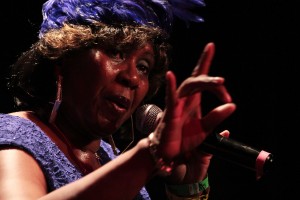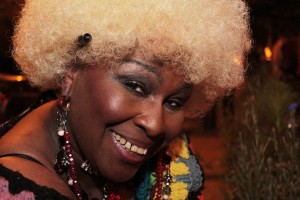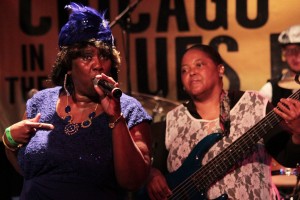CHICAGO WOMEN IN THE BLUES PACK REGGIES ON STATE STREET
Published in AXS.com, June 2015
![]()
 “The biggest thrill is that us women show other women how to keep a man happy and at home,” singer Shirley King declared after playing the Chicago Women in the Blues show on Saturday night. “Women have picked up instruments and now they’re in control of their music and people are loving it.”
“The biggest thrill is that us women show other women how to keep a man happy and at home,” singer Shirley King declared after playing the Chicago Women in the Blues show on Saturday night. “Women have picked up instruments and now they’re in control of their music and people are loving it.”
King, daughter of blues legend BB King and self-proclaimed Daughter of the Blues in her own right, was one of several ladies who electrified the stage for CWIB’s fifth annual gig at Reggies on State Street in the South Loop.
Besides nearly a dozen female vocalists, the lineup featured Donna Herula on slide guitar, Sherri LadyBass Weathersby on bass and TK the Tequila Kid on sax. For nearly five hours, the fruits of their labor flowed into the hearts and booties of fans who shook their thangs — both onstage and off — well past the concert’s scheduled closing time.
 Veteran working band Blue Road backed up every song, laying down rhythms and sending up solos worthy of the reputation they’ve built over years of gigging in the city. The band has played the event ever since it was founded, and their appreciation for the artists is as great as their love for the music.
Veteran working band Blue Road backed up every song, laying down rhythms and sending up solos worthy of the reputation they’ve built over years of gigging in the city. The band has played the event ever since it was founded, and their appreciation for the artists is as great as their love for the music.
“Women can get away with a lot more sexual innuendo than men can,” explains keyboardist Joan Gand. “Women can really let it all out.”
Gand ought to know. She founded Chicago Women in the Blues five years ago with the support of her husband, Gary, Blue Road’s lead guitarist.
“In 2011, they announced the roster of the Chicago Blues Festival and everybody was shocked because there were no women on it,” she says.
“Gary said, ‘we should organize a festival of all women.’”
Since then, the celebration has inspired hundreds of performances, including several by singer and Chicago Blues Hall of Fame Master Artist Liz Mandeville, who has played and emceed the showcase every year.
 Mandeville includes “politics, laws and attitudes towards women” among the examples of warped institutionalism that motivate her to take the stage, but she’s quick to add that the blues are universal.
Mandeville includes “politics, laws and attitudes towards women” among the examples of warped institutionalism that motivate her to take the stage, but she’s quick to add that the blues are universal.
“Everybody has troubles,” she says. “I don’t care if you’re rich or poor, black or white, yellow or red. We all have problems and heartbreak. The blues is a way for us to get that stuff out of our system so it doesn’t eat away at us.”
When they’re not performing, the Chicago Women in the Blues work as hard as they play. Mandeville keeps busy with her record label, Blue Kitty Music. The Legendary Holle Thee Maxwell hosts a music and history tour with guitarist Jimmy Burns. Singer Tracee Adams emcees at Lee’s Unleaded Blues Club on the South Side. LadyBasss Weathersby works on the Presidential campaign of Willie Wilson. And Gand plans to take the show on the road, performing Chicago Women in the Blues at festivals in Cincinnati, Ohio, and New Buffalo, Michigan, this summer.
 But Shirley King faces perhaps the biggest workload of them all: protecting her father’s legacy and royalties from the people who “he thought he could trust.”
But Shirley King faces perhaps the biggest workload of them all: protecting her father’s legacy and royalties from the people who “he thought he could trust.”
Days after BB King passed in May, attorneys for his executor, LaVerne Toney, filed suit against several of his children to prevent them from gaining control of his estate.
“They’re trying to abuse the family very badly,” King says, “and because I’m the singing daughter, I’m making sure that it stays my dad’s estate.”
The impending legal challenge does not seem to diminish her upbeat and confident spirit; rather, she appears invigorated. For Shirley King, the blues is not only a style of music that she learned from the best, but also a life that she has lived since she was a child.
 “When I was growing up, I hated the blues because it was like taking my dad away from me,” she says. “But when I came to Chicago and started hanging around all these different artists, especially Etta James, I really got the blues and I really embraced the blues and I really love the blues.”
“When I was growing up, I hated the blues because it was like taking my dad away from me,” she says. “But when I came to Chicago and started hanging around all these different artists, especially Etta James, I really got the blues and I really embraced the blues and I really love the blues.”
Understandably, her advice to young women is “to get 90% of the business” so that “no one will ever take anything from you.”
“They will only be able to take 10%,” she continues, “and that 10% won’t mean nothing.”
Photos by Dan Patton